Fishing is a popular pastime enjoyed by millions, but a common question arises: does hooks hurt fish? The short answer is yes, hooks can cause significant pain and injury to fish. However, the extent of the pain and the long-term effects depend on several factors, including the type of hook, the location of the hookset, and the handling practices of the angler. Let's delve deeper into this complex issue.
How Do Fishing Hooks Hurt Fish?
Fish, like all animals, possess a complex nervous system that enables them to feel pain. When a hook pierces their flesh, it causes immediate physical trauma. The sharp point of the hook tears through skin, muscle, and potentially internal organs, causing pain receptors to fire. This initial pain is acute and can be substantial, especially with larger hooks or deep penetration.
Furthermore, the barbs on many fishing hooks can exacerbate the injury. Barbs make it more difficult to remove the hook, causing more damage as the fish struggles. This struggle itself contributes to stress, exhaustion, and further injury. The longer a fish is hooked, the greater the potential for tissue damage, infection, and even mortality.
What Type of Hooks Cause the Most Pain?
Not all fishing hooks are created equal. The design and size significantly impact the level of pain inflicted on a fish. Larger hooks, designed for larger fish, naturally cause more extensive damage. Similarly, treble hooks (those with three points) can inflict multiple wounds simultaneously, increasing the pain and the risk of significant tissue damage. Conversely, smaller, barbless hooks cause less injury and are often easier to remove, minimizing suffering for the fish.
Do Barbless Hooks Hurt Less?
Yes, barbless hooks generally cause less pain and injury than barbed hooks. The absence of barbs allows for a quicker and easier removal process, reducing the duration of the fish's struggle and minimizing tissue damage. Barbless hooks are increasingly favored by responsible anglers who prioritize minimizing the impact on fish.
What Happens to a Fish After It's Hooked?
The experience of being hooked isn't merely a fleeting moment of pain. The effects can be long-lasting, depending on several factors:
- Hook location: A hook in the mouth is generally less damaging than one embedded deeply in the body cavity.
- Fighting time: A prolonged struggle exhausts the fish, weakening its immune system and making it more susceptible to infection and disease.
- Handling practices: Rough handling during removal can exacerbate injuries.
- Post-release care: Properly releasing a fish, including handling it gently and minimizing air exposure, significantly impacts its survival rate and recovery.
Can Fish Recover from Being Hooked?
Many fish can recover from being hooked, particularly if they are handled carefully and released quickly. However, some fish may suffer long-term consequences, including infections, reduced feeding capacity, and increased vulnerability to predation. The severity of these long-term effects depends on the factors mentioned above.
How Can Anglers Minimize Harm to Fish?
Responsible anglers can employ various techniques to minimize the pain and stress experienced by fish:
- Use barbless hooks: These significantly reduce the injury and make removal easier.
- Use appropriate tackle: Use tackle suitable for the size of the fish to reduce the fighting time.
- Handle fish gently: Avoid squeezing the fish too tightly, and support its weight to prevent injury.
- Unhook quickly and efficiently: Practice efficient unhooking techniques to minimize the fish's stress.
- Practice catch and release: Whenever possible, practice catch and release to minimize mortality.
By understanding the impact of fishing hooks on fish and employing responsible angling practices, we can ensure the sustainability of fish populations while continuing to enjoy the sport of fishing.
